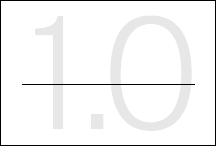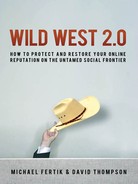
CHAPTER
Imagine a place where anonymous vandals can spray repugnant
graffiti about you or your business without any consequence. They
may call you a criminal, accuse your business of fraud, or reveal your
most personal secrets. And this graffiti is viewed not only by a hand-
ful of passersby—instead, it is spread worldwide and instantly broad-
cast to anyone who looks for information about you. You can’t remove
the smear, and copies of it are permanently saved around the world.
Sound frightening? You don’t have to imagine this scenario. It
happens every day on the Internet. The victims are innocent peo-
ple—parents, teachers, students, managers, workers, craftsmen, busi-
ness owners, and more. Real personal reputations are being trashed
with just a few mouse clicks, real businesses are losing thousands of
customers due to false reports online, and real relationships are be-
ing destroyed by anonymous gossip.
Welcome to the
New Digital Frontier
1
The Internet has changed the rules for reputation. Once, repu-
tation was hard-earned and carefully guarded. Today, your reputa-
tion can be created or destroyed in just a few clicks. And there are
plenty of people who seek to destroy your reputation: bullies, people
jealous of your success, competitors for jobs or customers (or even
loves), and gangs of disaffected teenagers. The Internet gives them
the power to permanently scar your reputation. They harness the
power of Google™ and the Web to broadcast false and distorted in-
formation about you and your business to your closest friends and
most distant customers. They can manipulate your photos, steal your
secrets, and ruin your credit. If you are prepared, you can defend
yourself from these attacks. But if you aren’t careful, you can just
make matters worse by fanning the flames.
Don’t even think of ignoring the Internet’s impact on your repu-
tation. The Internet is not some passing fad; it is here to stay. It is the
primary source of information about people, products, services, and
companies. Even if you don’t use the Internet, your boss, your cus-
tomers, your neighbors, your friends, and your family do. What they
find online will shape how they think about you, for better or worse:
they could find slanderous allegations or shocking photos posted by
a digital Peeping Tom; your business might be the subject of an on-
line boycott or an urban legend about your business might spread
through social discussion sites; or your relationships might be poi-
soned by false gossip. The worst part is that once false information
about you is spread online, it can start a self-sustaining cycle that
spreads it further and faster than you thought possible.
Luckily, the well prepared can still prosper on this new digital
frontier. The Internet is not something to be afraid of; instead, it is
a tremendous opportunity to shape the way that people see you or
your business. Careful monitoring of your online reputation (or that
of your business) combined with delicate intervention can help you
make sure that your online image is a true reflection of reality. Often,
by acting quickly you can stop online attacks and set the record
straight. And careful seeding of positive truthful content will help
Wild West 2.02
you improve your social standing, get more clients, or grow your
business. Thanks to the Internet, you have the chance to take direct
control of the way people see you.
This book will teach you what you need to know to prosper in
the new Wild West of online reputation. It will explain the rules of
the new digital frontier, teach you to measure and analyze your rep-
utation, and then give you the tools you need to defend yourself
from online reputation attack. It will also explain special consider-
ations and tactics for small businesses and professionals. In short,
not all hope is lost: by learning the tricks of online reputation, you
can defend—or even improve—your online image.
The Internet Is a New Digital Frontier
The Internet today resembles the Old West of American history.
Like the Old West, the Internet is rich with opportunity and hope,
but it is also still a rough-and-tumble place with many hidden dan-
gers. There is a chance for individuals to express themselves or strike
it rich, but the unprepared also face immense dangers. And, just like
in the Old West, law enforcement is weak, and traditional society
has not yet adapted to the strange new technology, social norms, and
culture of the Internet. In short, the Internet is a new digital fron-
tier that echoes the Wild West of American history. Call it “Wild
West 2.0.”
Just like in the original Wild West, countless people have struck
it rich on the new digital frontier. From the Google founders—now
among the richest people on Earth—to microbloggers who supple-
ment their incomes with a few hundred dollars a month in advertis-
ing revenues, the Internet has created a modern gold rush. And the
frontier is still open: There is still a chance for ordinary people to
change their lives forever with new and creative business ventures.
Thanks to the Internet, there are useful new services like pow-
erful search engines capable of finding any document on the planet
(Google), the largest and most comprehensive encyclopedia in the
Welcome to the New Digital Frontier 3
history of mankind (Wikipedia), and countless other sites that pro-
vide news, entertainment, and commerce. With just a few clicks it’s
possible to find out nearly any information, from the chemical for-
mula for caffeine (C
8
H
10
N
4
O
2
) to the name of the Red Sox’ third
baseman in 1912 (Larry Gardner). Research that would once have
required a trip to the local public library can now be conducted on-
line in seconds from anywhere in the world; a student sitting in class
in Calcutta can research any topic using the California-based
Wikipedia, and a student at home in California can just as easily
look up the weather in Calcutta.
The Internet has forever changed politics. Now, it is possible for
an anonymous whistleblower to reveal corruption to an audience of
millions. Sites that provide outlets for classified documents (such as
Wikileaks.org) exist because thousands of people want to reveal the
truth about government wrongdoing. Political dissenters in Iran have
organized their opposition to their government using e-mail and so-
cial sites like Twitter. Closer to home, supporters and opponents of
local or national political candidates can anonymously express their
deepest and most fervent beliefs. The power to speak anonymously
has generated wide-ranging debate on the biggest issues of the day,
free from constraints of political correctness and peer pressure.
Even more important, the world has become more closely con-
nected. Electronic mail has replaced postal letters: you can send an
e-mail across the globe in seconds for free rather than pay to send a
“snailmail” letter that might be delivered days or weeks later. Skype and
other Internet telephone services have slashed the cost of long-distance
phone calls, allowing far-flung families and lovers to connect for pen-
nies (rather than dollars) per minute. The ability to send videos and
photos electronically has allowed closer communication between
friends, parents, and others. Thousands of Web-based discussion fo-
rums allow far-flung people to discuss the issues most important to
them and to find like-minded souls spread around the world.
For all the praise heaped upon the Internet for opening up po-
litical and social thought, it might be just as useful for the mundane.
Wild West 2.04
The ability to get answers to basic questions has saved countless col-
lege students from pink laundry and burnt macaroni; the ability to
get phone numbers of local businesses has saved millions in “411”
phone charges; and the ability to plot driving routes electronically
has prevented countless drivers from getting lost.
The Dangers of Frontier Life Are Real
But, also as in the old Wild West, the frontier has expanded faster
than the law and our culture, which have proven unable to keep up.
There is no sheriff in town, and Internet users have been left with
rough frontier justice. Innocent reputations can be ruined by anony-
mous attackers, and the victims are often greeted with blank stares
by law enforcement. Disputes are settled at the ends of virtual pitch-
forks and torches instead of at a negotiation table or in a court of law.
People suspected of wrongdoing are run out of town on an electronic
rail, often before there is time to figure out whether they are really
guilty or innocent. And, all too often, the victims are innocent peo-
ple, who have done nothing wrong other than venturing online with-
out fully understanding the unique culture of the Internet.
The increase in connectivity that allows instantaneous research
and positive connections also brings with it the capability to do im-
mense harm. Popular search engines like Google that allow students
to research their homework also allow anybody anywhere in the
world to search for your name and find nasty commentary written by
a bitter ex-lover. Internet forums that empower positive discussions
also allow insular communities to gossip and spread lies about out-
siders. The power to instantly transmit data also allows malicious
software to spread worldwide instantaneously. The power to speak
anonymously about corrupt politicians also allows anonymous at-
tacks on private people who have done no wrong.
The Internet has grown too fast for social norms and common
sense to keep up. Special software makes it possible for malevolent
users to access the Internet anonymously without leaving any digital
fingerprints; society has not yet come to grips with truly anonymous
Welcome to the New Digital Frontier 5
..................Content has been hidden....................
You can't read the all page of ebook, please click here login for view all page.
